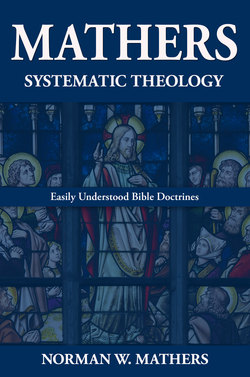Читать книгу Mathers Systematic Theology - Norman W. Mathers - Страница 3
На сайте Литреса книга снята с продажи.
Introduction
ОглавлениеThis systematic theology book is biblically based. We will cover each of the areas of systematic theology based on the teachings of Scripture. A summary will be given at the end of each chapter. A section of study questions will be given at the end of each chapter following the chapter summary. A good systematic theology must be biblically based. Good theology is good exegesis. Theologies may be philosophically based. They may be written using the quantitative research with its deductive method. The material is made to fit the preconceived ideas, pre-understandings, and presuppositions of the writer. This is not the purpose of Mathers Systematic Theology. Our systematic theology is based on the biblical truth for that particular division. In addition, theologies may be written based on philosophical or allegorical hermeneutics. The need is for a theology that is biblically based. A theology based on the qualitative method with its inductive approach. This will guard against philosophical statements that are a direct contradiction to the biblical text. In regard to objectivity, it is the author’s purpose to present a systematic theology that is biblically based.
Many writers of theologies lack adequate language training to do exegesis in the Old and New Testaments. The Master of Theology degree program at Dallas Theological Seminary provided me with more than adequate training in the original biblical languages of Hebrew and Greek. The inclusion of a few Hebrew or Greek words should not be interpreted as ability to do exegesis in the original languages.
Mathers Systematic Theology will establish the doctrines of each area of systematic theology: the bible (Bibliology), God the Father (Theology Proper), salvation (Soteriology),the Spiritual Life, biblical prophecy (Eschatology), Christ (Christology), sin (Hamartiology), man (biblical Anthropology), the church (Ecclesiology), and the Holy Spirit (Pneumatology). The biblical and exegetical basis for each of the doctrines will be followed by the questions concerning that particular doctrine. The ramifications of each doctrine will be explored. An example of this would be the present inerrancy versus the errancy debate of the Bible. The errancy position of Scripture is a philosophy rather than a sound biblical position based on exegetical inductions from the biblical texts. The author will interact with the biblical proof, draw a chapter summary for each doctrine, and an overall conclusion. Mathers Systematic Theology will be written in an easy to read style. I will include the essentials for each biblical doctrine and the ramifications. Mathers Systematic Theology is designed to be a scholarly, practical, and a ready reference work.
Norman W. Mathers, Ph.D.
Norman W. Mathers,
B.A., Wilfred Laurier University,
Th.M., Dallas Theological Seminary,
M.A., California State University, Carson,
Ph.D., University of Pretoria.
Dr. Mathers is currently Assistant Professor, School of Religion, Liberty University.
